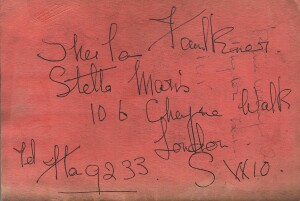We don’t know whether the Australian actor and flamenco dancer Trader Faulkner ( 1927 – 2020) acquired a copy of The Good Time Guide to London not long after he arrived in London from his home in 1950, probably accompanied by his mother Sheila, a former ballerina. But we do know that the couple moved into a houseboat named ‘” Stella Maris “moored off 160, Cheyne Walk, Chelsea, sometime in the early fifties. The Guide, which was specifically aimed at foreigners new to the metropolis, had a section on Chelsea.
‘…this is Chelsea, undisputed artists’ quarter of London. You can wear what you please, and nobody will give a damn. Though the painters and the designers, the ballet dancers and the actors ( my italics) may be outnumbered by the sober citizens, it is their spirit which dominates. Without it, Chelsea would lose the greatest part of its attraction…Cheyne Walk and Cheyne Row is where many an ambitious London dreams of buying a house some day…’
The same Guide also featured a section on ‘Ballet ‘, most of the contents of which would have been familiar to the Scottish-born Sheila, who under her given name of Sheila Whytock, had danced with Pavlova and had been in the audience when Diaghilev’s Ballet Russe had performed at Covent Garden in 1911. Three years later she and her English husband John Faulkner , a silent film star ( and inventor of a fridge and an elastic sided shoe ) , nearly two decades her senior, emigrated to Australia where in 1927, aged 56, he fathered Ronald, whom he nicknamed ‘ Trader ‘ after seeing him exchange some of his illicitly distilled whisky for marbles.
From 1914 John Faulkner had continued his successful acting career in Australia, but according to his son, began to drink heavily in 1932. Two years later, when Trader was just seven, his father died aged 62 and his mother, now in her forties, brought up her young son on a meagre income derived mainly from giving dancing lessons. One of her pupils was the celebrated ballerina Elaine Fifield.
Following his arrival in England Trader’s own acting career took off. He appeared on stage alongside Olivier, Vivien Leigh and Maxine Audley, and became friends with his fellow Australian Peter Finch. Sometime after 1956, while still living in ‘ Stella Maris ‘ , Sheila acquired a copy of Glenn Clark’s booklet (see previous Jot ) on Walter Russell, the visionary American artist and amateur scientist. This rather battered volume, damp stained from its years on ‘Stella Maris’, with its front and back covers scribbled over with Sheila’s very large handwriting in biro , also features a few passages marked by her as being of particular interest. For instance, in the chapter entitled ‘The Five Laws of Success’ she has emphasised the following:
“I once thought that greatness was the only thing worthwhile, but when I achieved it to some extent I found that I was not satisfied with it, because there was something beyond, so much higher, that all publicity and praise made me feel ashamed instead of proud, for I felt there was so much farther to go than I had gone. Early in life I had found that to achieve greatness one had to go only one inch beyond mediocrity, but that one inch is so hard to go that only those who become aware of God in them can make the grade, for no one can achieve that one inch alone. “
A page later Sheila marks the following for special attention:
“If you look reverently in the inward direction toward your inner self you will be amazed at what you will find. If you are alone long enough to get thoroughly acquainted with yourself, you will hear whisperings from the universal source of all consciousness which will inspire you. These are actual messages, actual revelations telling you, guiding you, showing you the way to the Source of the thought-world; and with great reverence you will step out from that Source, through the thought-world into the world of what we call creation to produce through you interpretations the images which crowd your mind which you do not see. You will soon find yourself using the cosmic forces which you also cannot see, instead of working blindly in the dark.”
Elsewhere she emphasises the following:
“Ask and you shall receive. You must, yourself, do the asking. In my philosophy is a passage which reads, ‘Mediocrity is self-inflicted. Genius is self-bestowed.”
And:
“…All knowledge exists in the God-Mind and is extended into this electrical universe of creative expression through desire. Knowledge is yours for the asking. You have but to plug into it. You do not have to learn anything, in fact, all you have to do is recollect it, or recognize it, for you already have it as you inheritance.”
It would be interesting to know why these passages came to mean so much to Sheila, but we’ll probably never find out. [ R R]


My father Charles Evan’s was a friend of Sheila. I visited the Stella Maris with him during the fifties and sixties. At her request he painted her bedroom ceiling with the stars of the southern cross. I remember she had a pair of Ann Pavlovas ballet shoes in a cabinet.
Happy memories.